#it was for scientific health reasons.
Text


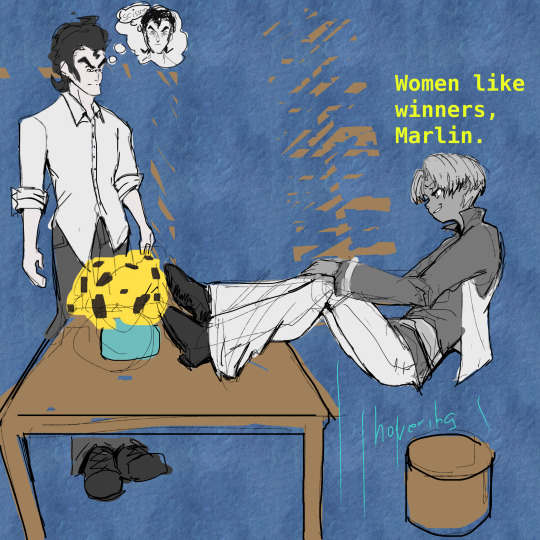

scribbles based on my Another Wonderful Life file where i discovered Rock and Nami showing up together at Vesta’s farmhouse late at night on multiple occasions to cause various types of chaos and disturbance and havoc until Marlin and Vesta’s bedtime (which they both announce in unison to kick everyone out) this included
Rock levitating and attempting to rizz up vesta
Nami making a beeline for Celia’s room where she stands around making very subtle remarks (celia isn’t even in her room)
Marlin Enduring
haunting crime scene photos of the shenanigans:
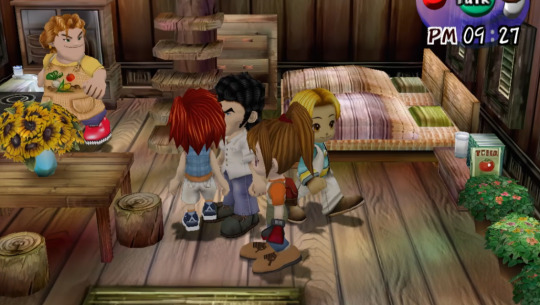
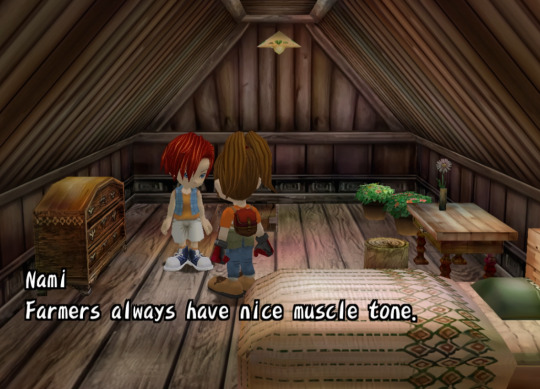
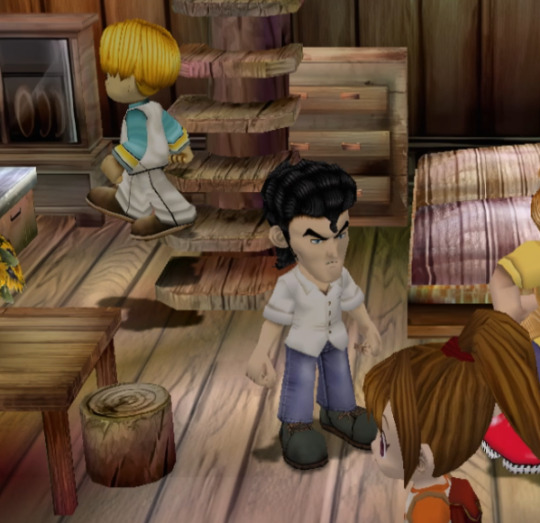

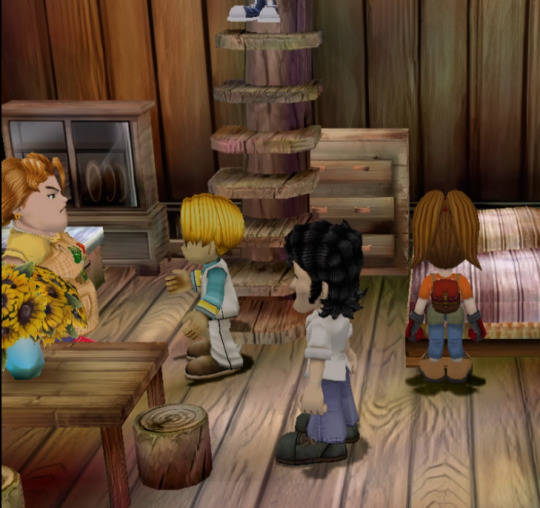
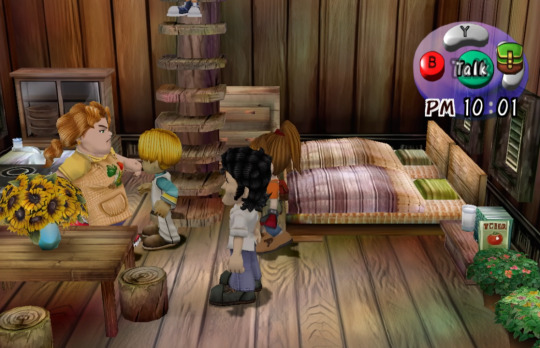
#bokumono#my art#harvest moon#rock tumbling (sos)#hm anwl#harvest moon a wonderful life#hm awl#story of seasons#harvest moon another wonderful life#rock (awl)#cora clownposting content#nami (awl)#marlin (awl)#awl pony#sos awl#story of seasons a wonderful life#hmanwl#for some reason i’m very amused when people visit each other in awl#levitating rock reminded me of mystery of the druids somehow. hence lowryposing#marlin is halligan coded. to me#rock and marlin were both on the murders squad when they lived in the city and fought for dominance over the pair of scissors#(the scissors don’t belong to either of them)#marlin’s myriad health issues come from his diet of pitza and cigarettes and straight medical alcohol#also the last picture is inspired by a very suspicious line vesta says in response to seeing the milker#which somehow sounds worse in japanese because of the phrasing#instead of ‘planning to milk me?’ she’s like ‘are you trying to squeeze mine?’#anyway. rock would take her ‘i’d like to see you try!’ literally and then get killed i think#i’m sorry (not sorry enough)#after analyzing everyone’s dialogue very scientifically i once again feel that the girls anwl lines have 1000% more bittersweet yearning#(no bias in analysis at all) i can’t explain it their lines obviously were targeted at me to make me long for them
135 notes
·
View notes
Text
(1) It’s Thursday
So I do “plan” on live-blogging tonight —Friday is usually always a guarantee, but yeah. Tonight I plan on it.
(2) I’m writing an essay/PPT about Bipolar —
seeing as I’ve been in an episode like— idk these last two?? Three weeks???
(And we share playlists every 2 months —J, Nacho, and I) — and since DPR Ian is basically all I’ve listened to for 2 months, I’m analyzing his songs for them as well.
So I just wanted to ask:
- if you guys have any general questions or curiosities about it?
This would help me know what areas I should explain or go in-depth on for my PPT and what not
- what you **do** know, or have at least heard about bipolar —or just your assumptions about it
-idk, anything you guys wanted to ask
Feel free to send in anons/asks, or to just comment
#yeah that’s if you guys have any questions 👻#it’s hard to know how other people perceive the disorder#feel free to just say whatever comes to mind on the topic#for scientific reasons#I’d really appreciate your help here /input lol!#my thougts#donbrothers liveblog#who let delivery boy bring a parade float to a gun fight#sentaisouped#before harvesting season#fvcking moodswings ⚡️✌️#bipolar#manic depression#mental health#idk what to tag here LOL#mood disorder#neurodiversity
3 notes
·
View notes
Text
Ooh I can feel the depression about to pounce and I hate it. This is gonna be a rough one (they're all rough ones).
#god why#I'm doing fine i really am#the fact that I'm also breaking out suggests my period is imminent#why is the week leading up to my period almost worse than the event itself m#also fun fact my sister and i live 4 hours apart but somehow our cycles are almost always in sync#like what's up with that#is there a scientific reason#anyway#depression#mental health#like this post to let me know I'm not alone#lately I'm feeling very unseen and unheard by my family
1 note
·
View note
Text
imagine if someone did keto without telling everyone they meet that they're on keto
#imagine being so proud that you don't understand the human body or nutrition#nobody call me out for my eating habits bc I DO understand nutrition actually#I just don't care about my health and have other priorities. I know how to have a good diet tho#actually I wrote a big research paper on eating disorders and nutrition isn't that funny#I had to read all these scientific papers and studies on anorexia like. haha I do that#so trust me. I know that what I do is unhealthy and also what happens inside my body and how it will affect me in the future#I just decided that I don't care 🙏#a healthy balanced diet just doesn't give me the same results that I get using other methods yk#anyways. I also don't encourage other people to eat like I eat. keto bitches do not shut up about what thwy do#and why everyone else should do it too and how it's the best thing ever#also they're really tired for some unknown reason but not sure why. weird#I'm a hater sorry this is personal to me#Sera
1 note
·
View note
Text
I get variations on this comment on my post about history misinformation all the time: "why does it matter?" Why does it matter that people believe falsehoods about history? Why does it matter if people spread history misinformation? Why does it matter if people on tumblr believe that those bronze dodecahedra were used for knitting, or that Persephone had a daughter named Mespyrian? It's not the kind of misinformation that actually hurts people, like anti-vaxx propaganda or climate change denial. It doesn't hurt anyone to believe something false about the past.
Which, one, thanks for letting me know on my post that you think my job doesn't matter and what I do is pointless, if it doesn't really matter if we know the truth or make up lies about history because lies don't hurt anyone. But two, there are lots of reasons that it matters.
It encourages us to distrust historians when they talk about other aspects of history. You might think it's harmless to believe that Pharaoh Hatshepsut was trans. It's less harmless when you're espousing that the Holocaust wasn't really about Jews because the Nazis "came for trans people first." You might think it's harmless to believe that the French royalty of Versailles pooped and urinated on the floor of the palace all the time, because they were asshole rich people anyway, who cares, we hate the rich here; it's rather less harmless when you decide that the USSR was the communist ideal and Good, Actually, and that reports of its genocidal oppression are actually lies.
It encourages anti-intellectualism in other areas of scholarship. Deciding based on your own gut that the experts don't know what they're talking about and are either too stupid to realize the truth, or maliciously hiding the truth, is how you get to anti-vaxxers and climate change denial. It is also how you come to discount housing-first solutions for homelessness or the idea that long-term sustained weight loss is both biologically unlikely and health-wise unnecessary for the majority of fat people - because they conflict with what you feel should be true. Believing what you want to be true about history, because you want to believe it, and discounting fact-based corrections because you don't want them to be true, can then bleed over into how you approach other sociological and scientific topics.
How we think about history informs how we think about the present. A lot of people want certain things to be true - this famous person from history was gay or trans, this sexist story was actually feminist in its origin - because we want proof that gay people, trans people, and women deserve to be respected, and this gives evidence to prove we once were and deserve to be. But let me tell you a different story: on Thanksgiving of 2016, I was at a family friend's house and listening to their drunk conservative relative rant, and he told me, confidently, that the Roman Empire fell because they instituted universal healthcare, which was proof that Obama was destroying America. Of course that's nonsense. But projecting what we think is true about the world back onto history, and then using that as recursive proof that that is how the world is... is shoddy scholarship, and gets used for topics you don't agree with just as much as the ones you do. We should not be encouraging this, because our politics should be informed by the truth and material reality, not how we wish the past proved us right.
It frequently reinforces "Good vs. Bad" dichotomies that are at best unhelpful and at worst victim-blaming. A very common thread of historical misinformation on tumblr is about the innocence or benevolence of oppressed groups, slandered by oppressors who were far worse. This very frequently has truth to it - but makes the lies hard to separate out. It often simplifies the narrative, and implies that the reason that colonialism and oppression were bad was because the victims were Good and didn't deserve it... not because colonialism and oppression are bad. You see this sometimes with radical feminist mother goddess Neolithic feminist utopia stuff, but you also see it a lot regarding Native American and African history. I have seen people earnestly argue that Aztecs did not practice human sacrifice, that that was a lie made up by the Spanish to slander them. That is not true. Human sacrifice was part of Aztec, Maya, and many Central American war/religious practices. They are significantly more complex than often presented, and came from a captive-based system of warfare that significantly reduced the number of people who got killed in war compared to European styles of war that primarily killed people on the battlefield rather than taking them captive for sacrifice... but the human sacrifice was real and did happen. This can often come off with the implications of a 'noble savage' or an 'innocent victim' that implies that the bad things the Spanish conquistadors did were bad because the victims were innocent or good. This is a very easy trap to fall into; if the victims were good, they didn't deserve it. Right? This logic is dangerous when you are presented with a person or group who did something bad... you're caught in a bind. Did they deserve their injustice or oppression because they did something bad? This kind of logic drives a lot of transphobia, homophobia, racism, and defenses of Kyle Rittenhouse today. The answer to a colonialist logic of "The Aztecs deserved to be conquered because they did human sacrifice and that's bad" is not "The Aztecs didn't do human sacrifice actually, that's just Spanish propaganda" (which is a lie) it should be "We Americans do human sacrifice all the god damn time with our forever wars in the Middle East, we just don't call it that. We use bullets and bombs rather than obsidian knives but we kill way, way more people in the name of our country. What does that make us? Maybe genocide is not okay regardless of if you think the people are weird and scary." It becomes hard to square your ethics of the Innocent Victim and Lying Perpetrator when you see real, complicated, individual-level and group-level interactions, where no group is made up of members who are all completely pure and good, and they don't deserve to be oppressed anyway.
It makes you an unwitting tool of the oppressor. The favorite, favorite allegation transphobes level at trans people, and conservatives at queer people, is that we're lying to push the Gay Agenda. We're liars or deluded fools. If you say something about queer or trans history that's easy to debunk as false, you have permanently hurt your credibility - and the cause of queer history. It makes you easy to write off as a liar or a deluded fool who needs misinformation to make your case. If you say Louisa May Alcott was trans, that's easy to counter with "there is literally no evidence of that, and lots of evidence that she was fine being a woman," and instantly tanks your credibility going forward, so when you then say James Barry was trans and push back against a novel or biopic that treats James Barry as a woman, you get "you don't know what you're talking about, didn't you say Louisa May Alcott was trans too?" TERFs love to call trans people liars - do not hand them ammunition, not even a single bullet. Make sure you can back up what you say with facts and evidence. This is true of homophobes, of racists, of sexists. Be confident of your facts, and have facts to give to the hopeful and questioning learners who you are relating this story to, or the bigots who you are telling off, because misinformation can only hurt you and your cause.
It makes the queer, female, POC, or other marginalized listeners hurt, sad, and betrayed when something they thought was a reflection of their own experiences turns out not to be real. This is a good response to a performance art piece purporting to tell a real story of gay WWI soldiers, until the author revealed it as fiction. Why would you want to set yourself up for disappointment like that? Why would you want to risk inflicting that disappointment and betrayal on anyone else?
It makes it harder to learn the actual truth.
Historical misinformation has consequences, and those consequences are best avoided - by checking your facts, citing your sources, and taking the time and effort to make sure you are actually telling the truth.
14K notes
·
View notes
Note
hi, i'm a fat person who is just starting to learn to love and appreciate my body and i'm very new to the fat community and all that.
i was wondering if you could maybe explain the term ob*se and how it is a slur. i've never heard anything about it being a slur before(like i said, i'm very new here) and was wondering if you could tell me the origin and history of the word or mayy provide links to resources about it? i want to know more about fat history and how to support my community but i'm unsure of how to start
Welcome!
Obesity is recognized as a slur by fat communities because it's a stigmatizing term that medicalizes fat bodies, typically in the absence of disease. Aside from the word literally translating to "having eaten oneself fat" in latin, obesity (as a medical diagnosis) straight up doesn't actually exist. The only measure that we have to diagnose people with obesity is the BMI, which has been widely proven to be an ineffective measure of health.
The BMI was created in the 1800s by a statistician named Adolphe Quetelet, who did NOT sudy medicine, to gather statistics of the average height and weight of ONLY white, european, upper-middle class men to assist the government in allocating resources. It was never intended as a measure of individual body fat, build, or health.
Quetelet is also credited with founding the field of anthropometry, including the racist pseudoscience of phrenology. Quetelet’s l’homme moyen would be used as a measurement of fitness to parent, and as a scientific justification for eugenics.
Studies have observed that about 30% of so-called "normal weight" people are "unhealthy" whereas about 50% of so-called "overweight" people are “healthy”. Thus, using the BMI as an indicator of health results in the misclassification of some 75 million people in the United States alone. "Healthy" lifestyle habits are associated with a significant decrease in mortality regardless of baseline body mass index.
While epidemiologists use BMI to calculate national "obesity" rates, the distinctions can be arbitrary. In 1998, the National Institutes of Health lowered the overweight threshold from 27.8 to 25—branding roughly 29 million Americans as "overweight" overnight—to match international guidelines. Articles about the "obesity epidemic" often use this pseudo-statistic to create a false fear mongering rate at which the United States is becoming fatter. Critics have also noted that those guidelines were drafted in part by the International Obesity Task Force, whose two principal funders were companies making weight loss drugs. Interesting!!!
So... how can you diagnose a person with a disease (and sell them medications) solely based upon an outdated measure that was never meant to indicate health in the first place? Especially when "obesity” has no proven causative role in the onset of any chronic condition?
There is a reason as to why fatness was declared a disease by the NIH in 1998, and some of it had to do with acknowledging fatness as something that is NOT just about a lack of willpower - but that's a very complicated post for another time. You can learn more about it in the two part series of Maintenance Phase titled The Body Mass Index and The Obesity Epidemic.
Aside from being overtly incorrect as a medical tool, the BMI is used to deny certain medical treatments and gender-affirming care, as well insurance coverage. Employers still often offer bonuses to workers who lower their BMI. Although science recognizes the BMI as deeply flawed, it's going to be tough to get rid of. It has been a long standing and effective tool for the oppression of fat people and the profit of the weight loss industry.
More sources and extra reading material:
How the Use of BMI Fetishizes White Embodiment and Racializes Fat Phobia by Sabrina Strings
The Bizarre and Racist History of the BMI by Aubrey Gordon
The Racist and Problematic History of the Body Mass Index by Adele Jackson-Gibson
What's Wrong With The War on Obesity? by Lily O'Hara, et al.
Fearing The Black Body: The Racial Origins of Fat Phobia by Sabrina Strings
#inbox#resources#the bmi is bullshit#fat liberation#fat acceptance#fat activism#bmi#medical fatphobia
946 notes
·
View notes
Text
Marshmallow Longtermism
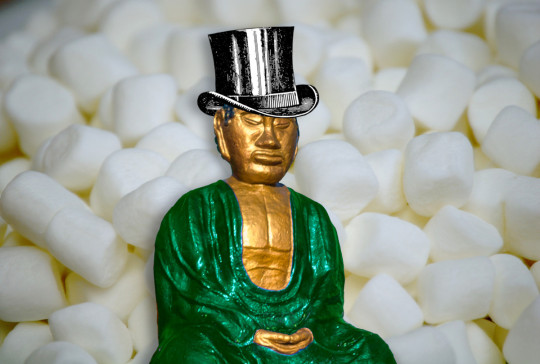
The paperback edition of The Lost Cause, my nationally bestselling, hopeful solarpunk novel is out this week!

My latest column for Locus Magazine is "Marshmallow Longtermism"; it's a reflection on how conservatives self-mythologize as the standards-bearers for deferred gratification and making hard trade-offs, but are utterly lacking in these traits when it comes to climate change and inequality:
https://locusmag.com/2024/09/cory-doctorow-marshmallow-longtermism/
Conservatives often root our societal ills in a childish impatience, and cast themselves as wise adults who understand that "you can't get something for nothing." Think here of the memes about lazy kids who would rather spend on avocado toast and fancy third-wave coffee rather than paying off their student loans. In this framing, poverty is a consequence of immaturity. To be a functional adult is to be sober in all things: not only does a grownup limit their intoxicant intake to head off hangovers, they also go to the gym to prevent future health problems, they save their discretionary income to cover a down-payment and student loans.
This isn't asceticism, though: it's a mature decision to delay gratification. Avocado toast is a reward for a life well-lived: once you've paid off your mortgage and put your kid through college, then you can have that oat-milk latte. This is just "sound reasoning": every day you fail to pay off your student loan represents another day of compounding interest. Pay off the loan first, and you'll save many avo toasts' worth of interest and your net toast consumption can go way, way up.
Cleaving the world into the patient (the mature, the adult, the wise) and the impatient (the childish, the foolish, the feckless) does important political work. It transforms every societal ill into a personal failing: the prisoner in the dock who stole to survive can be recast as a deficient whose partying on study-nights led to their failure to achieve the grades needed for a merit scholarship, a first-class degree, and a high-paying job.
Dividing the human race into "the wise" and "the foolish" forms an ethical basis for hierarchy. If some of us are born (or raised) for wisdom, then naturally those people should be in charge. Moreover, putting the innately foolish in charge is a recipe for disaster. The political scientist Corey Robin identifies this as the unifying belief common to every kind of conservativism: that some are born to rule, others are born to be ruled over:
https://pluralistic.net/2020/08/01/set-healthy-boundaries/#healthy-populism
This is why conservatives are so affronted by affirmative action, whose premise is that the absence of minorities in the halls of power stems from systemic bias. For conservatives, the fact that people like themselves are running things is evidence of their own virtue and suitability for rule. In conservative canon, the act of shunting aside members of dominant groups to make space for members of disfavored minorities isn't justice, it's dangerous "virtue signaling" that puts the childish and unfit in positions of authority.
Again, this does important political work. If you are ideologically committed to deregulation, and then a giant, deregulated sea-freighter crashes into a bridge, you can avoid any discussion of re-regulating the industry by insisting that we are living in a corrupted age where the unfit are unjustly elevated to positions of authority. That bridge wasn't killed by deregulation – it's demise is the fault of the DEI hire who captained the ship:
https://www.axios.com/local/salt-lake-city/2024/03/26/baltimore-bridge-dei-utah-lawmaker-phil-lyman-misinformation
The idea of a society made up of the patient and wise and the impatient and foolish is as old as Aesop's "The Ant and the Grasshopper," but it acquired a sheen of scientific legitimacy in 1970, with Walter Mischel's legendary "Stanford Marshmallow Experiment":
https://en.wikipedia.org/wiki/Stanford_marshmallow_experiment
In this experiment, kids were left alone in a locked room with a single marshmallow, after being told that they would get two marshmallows in 15 minutes, but only if they waited until them to eat the marshmallow before them. Mischel followed these kids for decades, finding that the kids who delayed gratification and got that second marshmallow did better on every axis – educational attainment, employment, and income. Adult brain-scans of these subjects revealed structural differences between the patient and the impatient.
For many years, the Stanford Marshmallow experiment has been used to validate the cleavage of humanity in the patient and wise and impatient and foolish. Those brain scans were said to reveal the biological basis for thinking of humanity's innate rulers as a superior subspecies, hidden in plain sight, destined to rule.
Then came the "replication crisis," in which numerous bedrock psychological studies from the mid 20th century were re-run by scientists whose fresh vigor disproved and/or complicated the career-defining findings of the giants of behavioral "science." When researchers re-ran Mischel's tests, they discovered an important gloss to his findings. By questioning the kids who ate the marshmallows right away, rather than waiting to get two marshmallows, they discovered that these kids weren't impatient, they were rational.
The kids who ate the marshmallows were more likely to come from poorer households. These kids had repeatedly been disappointed by the adults in their lives, who routinely broke their promises to the kids. Sometimes, this was well-intentioned, as when an economically precarious parent promised a treat, only to come up short because of an unexpected bill. Sometimes, this was just callousness, as when teachers, social workers or other authority figures fobbed these kids off with promises they knew they couldn't keep.
The marshmallow-eating kids had rationally analyzed their previous experiences and were making a sound bet that a marshmallow on the plate now was worth more than a strange adult's promise of two marshmallows. The "patient" kids who waited for the second marshmallow weren't so much patient as they were trusting: they had grown up with parents who had the kind of financial cushion that let them follow through on their promises, and who had the kind of social power that convinced other adults – teachers, etc – to follow through on their promises to their kids.
Once you understand this, the lesson of the Marshmallow Experiment is inverted. The reason two marshmallow kids thrived is that they came from privileged backgrounds: their high grades were down to private tutors, not the choice to study rather than partying. Their plum jobs and high salaries came from university and family connections, not merit. Their brain differences were the result of a life free from the chronic, extreme stress that comes with poverty.
Post-replication crisis, the moral of the Stanford Marshmallow Experiment is that everyone experiences a mix of patience and impatience, but for the people born to privilege, the consequences of impatience are blunted and the rewards of patience are maximized.
Which explains a lot about how rich people actually behave. Take Charles Koch, who grew his father's coal empire a thousandfold by making long-term investments in automation. Koch is a vocal proponent of patience and long-term thinking, and is openly contemptuous of publicly traded companies because of the pressure from shareholders to give preference to short-term extraction over long-term planning. He's got a point.
Koch isn't just a fossil fuel baron, he's also a wildly successful ideologue. Koch is one of a handful of oligarchs who have transformed American politics by patiently investing in a kraken's worth of think tanks, universities, PACs, astroturf organizations, Star chambers and other world-girding tentacles. After decades of gerrymandering, voter suppression, court-packing and propagandizing, the American billionaire class has seized control of the US and its institutions. Patience pays!
But Koch's longtermism is highly selective. Arguably, Charles Koch bears more personal responsibility for delaying action on the climate emergency than any other person, alive or dead. Addressing greenhouse gasses is the most grasshopper-and-the-ant-ass crisis of all. Every day we delayed doing something about this foreseeable, well-understood climate debt added sky-high compounding interest. In failing to act, we saved billions – but we stuck our future selves with trillions in debt for which no bankruptcy procedure exists.
By convincing us not to invest in retooling for renewables in order to make his billions, Koch was committing the sin of premature avocado toast, times a billion. His inability to defer gratification – which he imposed on the rest of us – means that we are likely to lose much of world's coastal cities (including the state of Florida), and will have to find trillions to cope with wildfires, zoonotic plagues, and hundreds of millions of climate refugees.
Koch isn't a serene Buddha whose ability to surf over his impetuous attachments qualifies him to make decisions for the rest of us. Rather, he – like everyone else – is a flawed vessel whose blind spots are just as stubborn as ours. But unlike a person whose lack of foresight leads to drug addiction and petty crimes to support their habit, Koch's flaws don't just hurt a few people, they hurt our entire species and the only planet that can support it.
The selective marshmallow patience of the rich creates problems beyond climate debt. Koch and his fellow oligarchs are, first and foremost, supporters of oligarchy, an intrinsically destabilizing political arrangement that actually threatens their fortunes. Policies that favor the wealthy are always seeking an equilibrium between instability and inequality: a rich person can either submit to having their money taxed away to build hospitals, roads and schools, or they can invest in building high walls and paying guards to keep the rest of us from building guillotines on their lawns.
Rich people gobble that marshmallow like there's no tomorrow (literally). They always overestimate how much bang they'll get for their guard-labor buck, and underestimate how determined the poors will get after watching their children die of starvation and preventable diseases.
All of us benefit from some kind of cushion from our bad judgment, but not too much. The problem isn't that wealthy people get to make a few poor choices without suffering brutal consequences – it's that they hoard this benefit. Most of us are one missed student debt payment away from penalties and interest that add twenty years to our loan, while Charles Koch can set the planet on fire and continue to act as though he was born with the special judgment that means he knows what's best for us.

On SEPTEMBER 24th, I'll be speaking IN PERSON at the BOSTON PUBLIC LIBRARY!!

If you'd like an essay-formatted version of this post to read or share, here's a link to it on pluralistic.net, my surveillance-free, ad-free, tracker-free blog:
https://pluralistic.net/2024/09/04/deferred-gratification/#selective-foresight

Image:
Mark S (modified)
https://www.flickr.com/photos/markoz46/4864682934/
CC BY 2.0
https://creativecommons.org/licenses/by/2.0/
#pluralistic#locus magazine#guillotine watch#eugenics#climate emergency#inequality#replication crisis#marshmallow test#deferred gratification
627 notes
·
View notes
Text
In photos of 2023’s World Economic Forum- or Davos as it is commonly called, after the Swiss resort town where it annually occurs- you might not notice the HEPA filters. They’re in the background, unobtrusive and unremarked upon, quietly cleansing the air of viruses and bacteria. You wouldn’t know- not unless you asked- that every attendee was PCR tested before entering the forum, or that in the case of a positive test, access was automatically, electronically, revoked. And if you happened to get a glimpse of the strange blue lights overhead, you could reasonably assume that their glow was simply a modern aesthetic choice, not the calming buzz of cutting edge Far UVC technology- demonstrated to kill microbes in the air.
It’s hard to square this information with the public narrative about COVID, isn’t it? President Biden has called the pandemic “over”. The New York Times recently claimed that “the risk of Covid is similar to that of the flu” in an article about “hold outs” that are annoyingly refusing to accept continual reinfection as their “new normal”. Yet, this week the richest people in the world are taking common sense, easy- but strict- precautions to ensure they don’t catch Covid-19 at Davos.
These common sense, easy precautions include high-quality ventiliation, use of Far UVC-lighting technology, and PCR testing. You’ll also see some masks at Davos, but generally, the testing + air filtration protocol seems to be effective at preventing the kind of super-spreader events most of us are now accustomed to attending.
It seems unlikely to me that a New York Times reporter will follow the super-rich around like David Attenborough on safari, the way one of their employees did when they profiled middle-class maskers last month. I doubt they will write “family members and friends can get a little exasperated by the hyper-concern” about the assembled Prime Ministers, Presidents and CEOs in Switzerland. After all, these are important people. The kind of people who merit high-quality ventilation. The kind of people who deserve accurate tests.
Why is the media so hellbent on portraying simple, scientifically proven measures like high-quality ventilation as ridiculous and unnecessary as hundreds of people continue to die daily here in the US?
Why is the public accepting a “new normal” where we are expected to get infected over and over and over again, at work events with zero precautions, on airplanes with no masks, and at social dinners trying to approximate our 2019 normal?
We deserve better. We deserve to be #DavosSafe as the hashtag going around on twitter puts it. Your children deserve to be treated with the care that world leaders are treating each other. Your family deserves to be protected from the disease which is still- unlike the flu- the third leading cause of death in the US. We don’t deserve to be shoved back into poorly ventilated workplaces while our politicians and press assure us that only crazy people would demand to breathe clean air.
Clean water and clean food are rights we fought for; we have regulatory bodies that ensure we aren’t exposed to pathogens via our water supply nor our food. In 1854, John Snow famously conducted his Broad Street Pump study in London and demonstrated that cholera was water-bourne; however, it took decades for our public policy to catch up with our scientific knowledge.
A public health case study published by the NBCI describes the years that followed:
The first use of chlorine as a disinfectant for water facilities was in 1897 in England. The first use of this method for municipal water facilities in the United States was in Jersey City, New Jersey, and Chicago, Illinois, in 1915. Other cities followed and the use of chlorination as standard treatment for water disinfection rapidly grew. During the 20th century, death rates from waterborne diseases decreased significantly, and although other additional factors contributed to the general improvements in health (such as sanitation, improved quality of life, and nutrition), the improvement of water quality was, without doubt, a major reason.
Forty-three years passed from the initial demonstration that pathogens were being spread via water, and public action and regulation to halt disease.
Can you imagine, in the 1890s, being somebody who argued against cleaning the water?
Can you imagine, in those years of plentiful cholera, calling the people who demanded shit-free water “hold outs”?
One thing COVID realists are accused of is being “doomsayers” and “fearmongers,” so let me share a dose of optimism about the future with you. When we choose- whenever we choose- to get COVID under control, there’s an exciting new world awaiting us. One, not only without constant COVID reinfection, but where our kids can grow up free of colds, flus, RSV, and many other common bugs. And no, contrary to what you may have heard, staying healthy (shockingly enough) is not bad for children!
Once we choose to institute ventilation standards and introduce new technologies like Far UVC lighting- and embrace masking as an easy, kind, and useful tool to control outbreaks- we can bring every nasty airborne pathogen under control the way we did cholera. We didn’t have the science before; now we do. (I mean that quite literally; I can’t recommend enough the linked Wired article cataloguing the long journey to establishing that Covid is, indeed, airborne).
We face a stark choice; down one road, the one with zero infrastructure upgrades, no air quality regulations, and Covid safety only for those who can afford it, you and your family will get Covid this year. You will get Covid next year. You will continue to get Covid over and over and over again, as the health problems - like cardiac damage, viral persistance, and immune system dysfunction- continue to build up. (The billionaires, of course, will not).
Down the other road, we quite simply treat ourselves the way Davos would. We engage with what the science is telling us and we build a safer, better world for our kids. We embrace the lessons this pandemic is teaching us, and let go of things we now know are harming people. We stop clinging desperately to the idea that 2019 will come back if we just get the virus one more time, and we come together to achieve what we’ve been told is impossible: elimination.
The economic elite thrive on our divisiveness and blame casting. They don’t mind that we’re calling each other names, engaging in racial stereotyping, or leaving disabled people to die, so long as we keep their machine running. But we can choose to stop throwing blame at each other, and direct it where it belongs: at the powerful people who’ve left us to suffer, at the politicians who are whipping people into a frenzy over masks instead of over our millions of dead, at the talking heads on TV that work so hard to convince us: you want to get sick. It’s better than being a *weirdo* or a *hold out*.
We needn’t wait 43 years to redirect our energies. France and Belgium have already introduced new air quality standards, and DIY projects to build Corsi-Rosenthal boxes for schools and healthcare settings have popped up around the country. We have the science, we have the technology. All we need now is the political will and the solidarity to truly end the pandemic- the kind of solidarity the super rich always show with one another.
The billionaires at Davos don’t accept continual Covid reinfection. They demand better. It’s time we demand better too.
8K notes
·
View notes
Text
Some hints about evaluating scientific studies
Firstly, understand that something being published in a scientific journal (or an academic journal for the social sciences) does not automatically make it true. Publishers profit from publishing novel, eye-catching, surprising research, which means they are more likely to publish positive results than ones that didn't find a connection between given variables. This means that scientists' careers benefit when they get positive results. Certain institutions also benefit from certain findings above others (a committee for research on "obesity" that is funded by a government organisation tasked with ending it, for example, is likely to try to stretch the evidence to find a link between body weight and poor health outcomes). So how do people evaluate scientific studies, especially without being scientists themselves?
Literature reviews
Literature reviews, which aim to assemble and summarise most of the available or influential papers on a given issue, can be a good place to start when trying to research that issue. Typically, scientific studies shouldn't only be evaluated on a case-by-case basis (since even well-designed studies can be contradicted by other, equally well-designed studies), but a full survey of the different results people have gotten should be taken.
Background information and conflicts of interest
Try to find out who funded a given study. Who published the study? What do these people stand to gain from the results of the study being accepted? (For example: you might pay special attention to the experimental design on a study on whether a certain essential oil helps to reverse hair loss that was carried out by a company that sells that oil.)
In theory, many journals call for study authors to declare any conflicts of interest they may have in a special section of the paper. This section should also list funding sources. You might also look up the authors on linkedin or something to find where they're employed; also look into whether another conglomerate owns that company, &c.
Experimental design
If the study involves a survey, have the authors of the paper provided the questions that people were asked, so that you can evaluate them for potential ambiguity or confusing wording? Not being transparent about the exact wording of questions is a sign that a study isn't trustworthy.
What's the sample size? Is it large enough for the claim the study is making to be reasonable? (More on this in the next section.)
Does the experimental design make sense with what the researchers wanted to study? Are the claims that they make in the conclusion section something that could reasonably be proven or suggested by the experiment that they performed?
Does the experimental design "bake in" an assumption of the truth of its hypothesis? (For example, measuring skeletons to argue that they fall into statistically significant size groupings by sex, using skeletons that you sorted into "male" and "female" groups based on their size, is clearly circular).
How was data collected? People might change their answers to a survey, for example, if they have to speak to a person to give them, rather than writing them down anonymously. Self-reported information (such as a survey aiming to figure out average height or average penis size) is also subject to bias. A good study should be transparent about how the authors collected their data, and be clear about how this could have affected their results.
Also regarding surveys: do the categories that the authors have divided respondents into make sense? Are these categories really mutually exclusive? If respondents were asked to sort themselves into categories (e.g., to select their own race or ethnicity), is there any guarantee that they all interpreted the question / the boundaries of these categories the same way? How would this affect the results?
Interpretation of results
Could anything other than the conclusion that the authors came to explain the results of their experiment? For example, a study finding a correlation between two variables and assuming that this means one variable causes the other ("being in a lot of stress causes short stature" or vise versa) could be missing a secret third thing which is in fact causing both of those things (e.g., poverty). Check to make sure that the authors considered other explanations for their findings and ruled them out (for example, by controlling for other variables such as socioeconomic status).
Are the results of the study generalisable to the population that the authors claim they're generalisable to? For example, the results may not be true for the entire population if only cisgender men between the ages of 30 and 40 were tested. Sampling biases can also affect generalisability—if I surveyed my college to try to find out the percentage of women in the total population, you might ask "but is your college sure to have the same percentage of women as the Earth does?"
Statistics
Are the results statistically significant, or are they within expected margins of error?
Many studies provide a p-value (a number between 0 and 1) for their results. In theory, a p-value represents the chance that the study's results could have been achieved by random chance. If you flip a coin ten times (so, your sample size is 10), it's not very odd to get heads six times and tails four times, and you wouldn't accept that as proof that the coin lands on heads more often than tails. The p-value for that result would be high (that is, there's a high chance that the coin appears unfair only because of random chance). On the other hand, if you flip a coin 100,000 times and it lands on heads 60,000 of those times, that's much better evidence that the coin is not a fair one. The p-value would be much lower. Typically, a p-value lower than 0.05 is considered statistically significant.
In practice, there's more than one way to calculate p-values, and so studies sometimes claim p-values that seem absurdly low. A low p-value is not proof of a claim in and of itself. Check to make sure that the authors of the paper also provide the raw data, and not just the p-values; this indicates a concern with other people being able to independently evaluate their results, rather than just trying to get The Best Numbers.
Citations
If the study cites something that seems foundational to their claims or interpretation, try tracing it back to the paper that was cited. Does the source actually claim what the authors of the first study said it did? Does the source provide proof or support for the claim, or does it seem flimsy, like a "common-sense" assumption?
Replication
Check the studies that cite the one you're currently looking at. Has anyone else tried to replicate the study? What were their results?
What if I really, really don't want to read scientific studies?
That's fine. Not everyone is concerned enough with specific scientific questions for regularly reading scientific papers to be reasonable for them. Just keep in mind that not everything in a scientific journal is necessarily true; that profit motives and personal and institutional bias impact results (e.g. when some studies revealed a lack of poor health outcomes for "obesity," and many scientists responded by calling it a "paradox" that needed to be "solved"); and that pop science and journalistic reporting on science are subject to distortions from the same sources.
Try finding commentators on scientific matters whose output you like, and evaluate their writing the same way you would evaluate any other critical writing.
#feel free to add on!#this doesn’t really incorporate the extent of my cynicism wrt to scientific establishment but. lol#reading comprehension#critical thinking
2K notes
·
View notes
Text
What No one Tells You about Writing Fantasy, #2!
I did this list about 7 annoyances about fantasy, but I write in this genre for a reason! Fantasy knows no bounds, it can encompass all other genres within it. You can write a fantastical murder mystery, fantasy horror, fantasy romance, political drama, slice-of-life, comedy, whatever you’d like!
Whether it’s urban or high fantasy, supernatural or scientific, here’s seven great benefits of writing in this genre:
1. No modern means of communication
Unless you’re writing a world with phones or phone-adjacent devices. Phones and instant communication seriously inhibits the plausibility of dramatic irony and tension when you have to keep coming up with reasons to keep your characters from calling or texting each other everything they know. It’s exhausting, I tell you, and such a relief when phones aren’t a factor.
With that said, without phones, you have complete freedom to design your own magical channels of supernatural FaceTime, as weird and zany as you want. But without instant connections? Your character who knew too much can’t pass on the intel before they die. Your hero team can’t call for backup in their darkest hour. Otherwise easily preventable tragedies and deadly miscommunications are now very real.
2. The Monster Allegory
Fantasy and sci-fi tend to overlap more than they’re set apart, and in that overlap sits the monster allegory. Everything from werewolves to vampires to witches, reapers, demons, angels, goblins, trolls, wraiths, fairies, mermaids, ghosts, to Eldritch horrors and your classic Hollywood cast of mummies, creatures from the black lagoon, and Frankenstein.
Most of the time, the monsters aren’t just monsters, they represent a monstrous aspect of society the author wants to challenge and caricaturize in a fun and entertaining way. Or, the monsters are the good guys and the humans are the real terrors. Or, you’ve got two kinds of monsters to allegory two human sides. Sometimes they represent metaphorical demons, like vampires often representing addiction and werewolves repressed identities.
What all of this boils down to is the hyperbolic nature of science fantasy that allows you to go over-the-top with your metaphor and allegory in a way that a book grounded in reality just can’t.
3. Magic Systems!
Do you love world building? Do you love filling pages upon pages with your cool and unique set of superpowers you want your characters to have? Do you dream about your fight scenes and dramatic slow-mo shots?
Then Fantasy is for you!
There are zero limits to how you want to define your magic system. You can go classic with the familiar archetypes of elemental magic, wizards, sorcerers, and witches. Or you can step off the beaten path and design a whole new funky system of power sets. Best part? Your readers will have an awesome time imagining themselves with those powers, and debating endlessly about how it works.
4. Real-World Politics, who?
Amazon’s Rings of Power was twice-doomed when they only got the rights to adapt the appendices of The Silmarillion and when they decided to inject current political problems into a timeless story written purposefully to be divorced from those politics. You *can* write about human politics, but in fantasy, you don’t have to. You *can* interpret Lord of the Rings to be an allegory about the World Wars, but no matter how hard you argue, it wasn’t written with that intent.
Which means: Even if your story is set in the reality-adjacent fantasy version of 1543, you are free from the following: Racism, homophobia, sexism, religious bigotry, mental health bigotry, gender norms, anti-feminism, toxic masculinity, and more. “But that’s how it was-”
Nope. This is fantasy. You built this world, you decided to keep in the discrimination. Or… You can fill your fantasy world with a rainbow of gays, POCs in power, women in power, men unafraid to be compassionate and caring, a religion that doesn’t foster hate and division, the list goes on. You. Are. Free.
5. Nothing is too “unrealistic”
Both that you will always have people whining about how X would never happen so write the book you want to read, but also because fantasy is fake. Fairies aren’t real. Mermaids aren’t real. There are no rules for how they must be written and that’s how we have so much variety with so much room for interpretation by so many creators. Twilight made how much money writing about vampires that sparkle like diamonds in sunlight and crack like marble?
This is fantasy, it’s supposed to be unrealistic. Yes, your plot should make sense, but don’t be afraid to get weird. Write at least some of your story dependant on those fantasy elements. Write a story that can’t just be told in the real world minus the spectacle. Don’t be afraid to be sincerely fantastical and weird. People love weird. People love loving weird.
6. You are in complete control
But you do still need to research, unfortunately. Unless this is urban fantasy that depends at least a little on the human world, yours is completely your own to govern like a god tweezing weeds from their garden. You get to design your own geography and weather patterns and seasons. Your own countries and kingdoms and politicians. Your epic pre-canon fantasy war and the stakes that it was fought over. Your species, races, and ethnicities.
It’s a shame that a movie like Avatar (2009) set out to be this wholly unique take on aliens with music completely divorced from earthly bonds, new languages and a visually and culturally distinct alien species… and ended up a largely generic blue Pocahontas in space. It forgot that it was fantasy and didn’t go weird enough. They have horses, monkeys, wolves, rhinos, and deer just re-skinned with some extra limbs and colors. It’s pretty but it’s so, so shallow.
It could have become a cult classic like many a positively *weird* 80s off-beat fantasies, and now it just… exists. It makes a whole lot of money but its impact on the cultural zeitgeist is negligible. I’m the only person I know that can name every major character in the movie, and I’m no Avatar obsessor. They had complete creative control, and this is what they did with it. Don’t be Avatar. Take your creative freedom and run.
7. Even if it has been done before, do it again
You can say this about any genre, particularly romance, but fantasy and sci-fi, by the gatekeep-y nature of their fans, can be a lot less forgiving when it comes to claims of “unoriginality”. No one hates Star Wars more than Star Wars fans. Fans of these genres can get… concerningly attached to their favorite stories (mostly because the people who like them had only their fictional heroes to protect them from very real bullies).
But Game of Thrones exists because the author likes Lord of the Rings and went “yes, but what if it was an R-rated parade of misery?” Dungeons and Dragons exists because people wanted to roleplay in an LotR-esque world. Legolas and Gimli single-handedly defined what a badass elf and dwarf looks like in high fantasy. And people still gobble up media ripping shamelessly, or even good-naturedly, from this one story.
So on my other list, I argued that the sum of your parts is still original, even if the components aren’t. On this list, I implore you this: It’s not stealing or appropriating to write another Legolas if you love Legolas. Everyone loves Legolas. How many generic buff action heroes do we have and love? How many Hallmark romances tread the same predictable path? Who gives a damn if it’s unoriginal? Just make it entertaining and have something fresh to say in the end (or don’t, that’s fine too), and people will read it.
And when people say “Oh, you mean like Legolas”, take it as a compliment, not an insult. Yes, exactly like Legolas. Here’s my new elf because I adore this other book, now watch him go on a new adventure that I wrote for him.
#writing advice#writing resources#writing tips#writing tools#writing a book#fantasy#scifi#writeblr#writing#what no one tells you about writing
853 notes
·
View notes
Text
Considering the blissful ignorance with which Armenia is treated by the foreign press, I’ve taken it upon myself to keep you (those who care) updated on what needs to be known.

BACKGROUND
Following years of violations of ceasefire and intimidation against Armenian civilians, Azeri military forces used massive force in September 2020 to invade and occupy two-thirds of Nagorno-Karabakh. In September 2023, Azeri military forces took over the remaining territory, contradicting previously agreed-to negotiations and statements (OSCE peace negotiations, trilateral statements 2020,2021).
While an ethnic cleansing was taking place, the Azeri government arrested eight former members of the Republic’s government and advocates for the self-determination of Artsakh. Those detained include Ruben Vardanyan, an Armenian businessman and philanthropist who served as the State Minister of the Artsakh government.
Mr. Vardanyan and the seven others join over 50 Armenians arrested during the conflict, some of whom have been held for years by Azerbaijan. The negligible information on the health and well-being of these prisoners is deeply concerning.
Ruben Vardanyan
In addition to being the State Minister of the Artsakh government, Ruben Vardanyan is an influential Armenian philanthropist who in 2024 was nominated for Nobel Peace Prize for the creation and support for around five dozen new and unprecedented educational, charitable, scientific and humanitarian structures not only in Armenia, but also in a number of other countries.
Mr. Vardanyan has been charged with financing terrorism, although the legal situation for him and the others remains unclear and lacks transparency. The charges levied against him are considered completely unsubstantiated and are seen as an act of political retribution.
For this reason, it appears Azerbaijan is holding him as a political prisoner, hindering his ongoing projects and suppressing a voice advocating for progressive and positive change.
“We are gravely concerned about my father’s deteriorating health, though we are not surprised by his bravery," said David Vardanyan, one of Mr. Vardanyan's sons. "Despite our initial relief, my father’s conditions are only worsening. The world has shown Azerbaijan that it is watching the fate of the Armenian prisoners, including my father, and from our family I want to thank everyone for their support at this difficult time. I hope that this growing international attention may lead to his release in the nearest future. We urge the international community to further increase the pressure on Azerbaijan to ensure that at least his trial takes place in May 2024 with international observers.”
The State Department’s annual Human Rights Report, released on April 23, corroborated the unjust conditions that Mr. Vardanyan and other political prisoners and detainees face in Azerbaijan. The report on Azerbaijan estimated that the country held approximately 254 political prisoners and detainees as of December 2023. The judiciary was also described as largely corrupt, inefficient, and lacking independence. According to the report, defendants in Azerbaijan were often “denied the right to a presumption of innocence; a fair, timely, and public trial; to communicate with an attorney of their choice; to have adequate time and facilities to prepare a defense; to confront witnesses and present one’s own witnesses and evidence; and not be compelled to testify or confess guilt.”
Today Azerbaijan has extended the detention period of Ruben Vardanyan by 5 months.
HELP FREE RUBEN VARDANYAN
Join the international community in calling for Ruben Vardanyan’s release alongside the other Armenians being held in Baku, Azerbaijan.
TAKE ACTION by adding your name to THE LIST of supporters.
#break the chain of ignorance#world news#armenia#armenian history#artsakh is armenia#ruben vardanyan#call for peace#world history#nobel prize#nobel peace prize#reporting from yerevan
512 notes
·
View notes
Note
What's your stance on Ford as a person? Honestly, I believe that for thr majority of canon he is a bad person. But I believe he grew. Still not great though XD
(Love him anyways obvs)
I disagree entirely! I think he's equally as good a person as any of the other main cast.*
*Except Mabel, who, as we all know, is always right about everything.**
(**This is a lighthearted joke. For the love of god, I don't want Mabel discourse in my inbox.)
His biggest sins in the show:
After telling his brother that he was thinking about changing their shared life plans, and then discovering that his brother had gone to the high school that night for no good reason and gone to the science fair for no good reason and messed around near Ford's science project for no good reason and broke it and didn't tell Ford about it... Ford believed Stan did it intentionally and held a grudge for it. You know what, it WOULD be pretty damn hard to believe it was an accident.
Hilariously ill-equipped to cope with Fiddleford's mental health. A guy who responds to "I have anxiety" with "have you tried yoga, it helps me" isn't a bad person, he's clueless. "Character cheerfully enacts a bad idea while a loved one in the background goes NO PLEASE DON'T DO THAT" describes half the episodes of Gravity Falls.
Was successfully manipulated by a professional manipulator into believing his best friend wished him ill. Man, what a terrible person Ford is for being manipulated by a manipulator and saying cruel things to somebody he'd been genuinely convinced was trying to harm him.
??? Didn't say thanks to a guy he was still mad at after the guy fixed a problem he himself had caused. This is a solitary example of stubborn bad etiquette, jesus christ. There's half a dozen different reasons why it makes perfect sense Ford wasn't in the right mindset to feel grateful, this is not something worth indicting his entire character over.
He had high ambitions, which everyone seems to lambast him for, but high ambitions that wouldn't have required doing anybody harm! (Until the professional manipulator started manipulating him into harming the people around him, but we are going to demonstrate some reading comprehension and not blame Ford's underlying morality as a person for things he never would've done if not for Bill's bullying, con artistry, and outright lies.) Like, what is it that he wanted to do with his life? Use his talents to get rich and famous? Shit, that's exactly what Stan wanted to do with his life. It's what Dipper fantasizes about doing with his life. Even Mabel, who thinks about her long-term future the least, dreams big with her art & performances and is already making big money off cheap-ass commissions. What terrible people they all are, for—let me check my notes here—uhhh... unrealistically fantasizing about achieving success in life by doing the things they're good at.
When their dad accuses Stan of lying as a child, Ford puts his entire summer on the line to defend Stan even though he knows Stan is a habitual liar and has no reason to believe Stan is telling the truth this time.
When his new college roommate he barely even knows gets laughed at for proposing an outlandish scientific theory, his first emotion is outrage at this injustice and he drops everything to convince his already-despondent roommate that he was right and help him prove it beyond a shadow of a doubt.
When he moves to a new town, he tries again and again to befriend his new neighbors, and fails not because he's rude or a jerk, but because he's awkward as hell, tells terrible jokes, and sucks at identifying phoenixes.
When Fiddleford gets hurt around him, he cares about it, feels guilty about putting him in that position, doesn't want it to happen again, and tries his best to help even though he's bad at helping.
When he gets kidnapped by a weird holiday folklore creature, he concludes without even thinking about it that he's now in charge of protecting and rescuing the kidnapped kids. Yeah, then he immediately starts hollering at the folklore creature for trying to impose his religious beliefs on Ford and the kids—but like, Ford was right tho, he just had bad timing.
When he discovers that the Northwest family committed atrocities against their poorer neighbors a century ago, his first instinct is to march up to their house, find the first Northwest he can locate, and give them a piece of his mind for it. Like, this won't even FIX anything. He's just THAT OUTRAGED over the injustice.
When he sees what he thinks is a fortune telling fraud conning the people, he attempts to debunk her because he's mad to see someone cheating other people with lies—and when he can't debunk her, he just leaves her alone rather than harass her about it. Typically, if assholes think somebody's doing something wrong but don't have any proof of it and fail to get proof when they look, they decide they're right anyway and keep giving that person shit. Ford doesn't give her shit. That's the opposite of an asshole move.
When he discovers his Portal To Knowledge (And Fame & Fortune) is actually a Portal To Doom (But Still Possibly Fame & Fortune, Maybe Even Godly Power), he isn't tempted for a second to keep working on it anyway. There is no moment where Bill manages to tempt him. No matter what Bill offers, no matter how long Bill offers, never, at ANY point, does Ford have a SECOND of "but what if I did make a deal with the devil?" the way so many heroes in similar situations often do.
You ever notice that? So often moral moments in the show are presented as choices the characters make. Will or won't Dipper give Bill a "puppet" in exchange for knowledge. Will or won't Stan fight a pterodactyl to protect Mabel's pig. Will or won't Mabel hand Bipper the journal. Ford is never given a "will or won't he" moment over Bill's threats, offers of friendship, or offers of infinite power—he steamrolls straight past them without a second of consideration—because, to him, the selfish, cowardly, easy choice ISN'T EVEN AN OPTION. He doesn't even SEE it as making a choice because the possibility of doing the wrong thing is invisible. A character who wavers first before turning Bill down would look more noble for "overcoming" temptation—it's harder to notice just how much stronger Ford's moral compass must be to not even feel temptation in the first place.
Greed and pride never tempt him to join Bill's side. Exhaustion, despair, and fear never tempt him to give up. He bears up under weeks, possibly months of extreme sleep deprivation, physical torture, psychological torture, emotional torture, threats of death, threats of brainwashing, threats to his family. He doesn't hold up so that he can pat himself on the back for being a hero—if that was all it was he would've gone "screw it, this isn't worth it and nobody would know I'm the one who gave up" a week in—he does it because he simply knows it must be done and because he's so isolated (half because of Bill's influence!) that he believes he's the one who must do it, all alone.
Thinking he has to do it by himself isn't egotism or pride; it's helplessness. He thinks no one else stands a chance. He thinks he's alone.
And, when he discovers his Portal To Knowledge is a Portal To Doom, he immediately feels guilty. No trying to deny the situation to protect his ego. No shuffling the blame off to someone else. No "maybe the apocalypse could have a silver lining!" No locking the door and trying to ignore the problem. He blames himself for being fooled—he IMMEDIATELY takes full responsibility for his actions—and he CONTINUES to take responsibility FOR THE NEXT THIRTY YEARS.
He takes more responsibility than is even warranted—he treats himself like he's an idiot for believing in an APPARENT GOD who's been practicing manipulating humans for thousands of years and who had never given Ford reason to believe the portal was anything but what Bill said it was. He beats himself up to no end every single time his past with Bill comes up. He even keeps beating himself up thirty years later when he's shoving warning notes to future readers in Bill's evil unkillable book!
When he falls into the multiverse, he dedicates his entire life NOT to finding a way to rescue himself, but to finding a way to permanently stop the CHAOS GOD who's still at the threshold of destroying Ford's world and countless others. He makes himself a hated criminal in the process, just to stop Bill. He's ready to spend the rest of his life trying to protect a world he doesn't think he'll ever see again. He does it because, as he sees it, somebody has to stand in between the children and the obnoxious folklore cryptid menacing them, and he's the only adult in this damn cave with the skills and knowledge for the job.
When he gets home, he doesn't tell his family about Bill and his quest because he's afraid that doing so will get them involved and endanger them too—and because he's too deeply ashamed of himself and his mistakes to stand the thought of his family knowing about the horrible things he's done (AGAIN, WHILE BEING MANIPULATED BY THE GOD OF MANIPULATION).
He loves his great-niece and great-nephew the second he lays eyes on them; he nevertheless tries to steer away from them to keep them safe from Bill; and yet he caves to the very first temptation to emotionally bond with his great-nephew he gets, because in spite of his noble "keep them safe" intentions, he wants so so badly to be close to his family.
As pissed as he still is at Stan and even though neither of them can look at each other without hissing like cats, he still makes an attempt to start bridging their divide by inviting him to play DD&MD.
When the apocalypse happens, he immediately puts his life on the line to try to kill Bill.
And when he's captured, isn't fazed for a second by Bill's offers or threats... until his family is threatened. The exact thing he'd been trying to avoid & prevent from the very start.
And when he's reunited with Fiddleford, his immediate reaction is to point out that Fiddleford's well within his rights to hate him—which isn't a new revelation, it's not like Ford had to do any soul-searching to reach this conclusion, he'd concluded that 30 years ago the instant he realized Bill had played him and that he'd been lied to about Fiddleford.
And then he tries to kill Bill again.
And then he's ready to sacrifice his own life to kill Bill—and the only reason he doesn't is because he has a metal plate preventing him from making the sacrifice... but, Stan doesn't have a plate. If Ford hadn't had the metal plate, he would have gladly done the exact same thing Stan did—and he would have thought it was right for him and only him to make that sacrifice, because it's VERY clear he feels (and has felt from the start) that this is all his fault and he's obligated to fix it.
Over and over and over, these are Ford's two defining character traits: getting so pissed off at injustice that his common sense shuts off and he goes into terminator mode until he's righted this wrong as best he can, even when he can't actually do anything about it; and feeling like he's Atlas, weighed down with the full responsibility of fixing everything he's done wrong and made to believe that, for everyone else's sake, he has to do it all alone. Even when doing so puts himself in harm's way, even when he has to put his entire life on hold for it, even if it might cost him his life. Scrape off his awkward social skills, his loneliness, his nerdiness, his endless curiosity, his zealous love of the strange, his starry ambitions, his yearning for recognition and success—scrape his personality down to the bone and that's what you're left with. A man who believes in defending the exploited so strongly that it makes him a little stupid.
I'm gonna go out on a limb and assume that you probably don't think Stan's fundamentally a bad person, and that you probably think that isn't even worth questioning. Stan's made a whole career out of swindling people, conning them out of as much money as he possibly can, stealing, lying, committing a long list of goofily-named crimes, and attempting douchy pick-up artistry on women; and to cap it all off, he held the safety of the entire universe hostage to demand a goddamn "thank you." Don't send me any "But he had reasons—" "But it was only to—" I don't need it, I don't want the essay, I'm not arguing that Stan's a bad guy, it's fine.
But. You can look at Stan's moments of cruelty and unkindness, his uncharitable thoughts, his character flaws, and think, "that doesn't define him. He's more than his cruelest moments and worst mistakes. He's imperfect, but he cares so much and his heart's in the right place, and beneath all the flaws his core is good."
And if you can't do the same for Ford, it's not because he's a worse person. It's because we got two seasons with Stan and five and a half episodes with Ford—and while we saw Stan yearning to fish with the kids or encouraging Mabel to whoop Pacifica's butt at minigolf or crying over a black and white period drama or punching zombies to save his family, we only saw Ford at the worst moments in his life and under the stress of a prolonged apocalyptic crisis—and, it so happens, all the moments he was pissed at the guy we spent two seasons learning to love.
Ford's got moments of cruelty and unkindness, uncharitable thoughts, and character flaws. But, at his core, he's a good person, and he always has been, and he still is.
#anonymous#ask#gravity falls#grunkle ford#ford pines#(note to self: when you see an ask that makes you go 'god i don't wanna get into this; i'll type something quick & punchy and move on'—)#(—do NOT start typing something 'quick & punchy' when your adhd meds are wearing off.)#(they WILL last just long enough for you to snap into a hyperfocus but not long enough for you to have the power to stop typing.)#(i'm thirsty.)#meta
341 notes
·
View notes
Text
By: Jesse Singal
Published: Jun 27, 2024
In April Hilary Cass, a British paediatrician, published her review of gender-identity services for children and young people, commissioned by NHS England. It cast doubt on the evidence base for youth gender medicine. This prompted the World Professional Association for Transgender Health (WPATH), the leading professional organisation for the doctors and practitioners who provide services to trans people, to release a blistering rejoinder. WPATH said that its own guidelines were sturdier, in part because they were “based on far more systematic reviews”.
Systematic reviews should evaluate the evidence for a given medical question in a careful, rigorous manner. Such efforts are particularly important at the moment, given the feverish state of the American debate on youth gender medicine, which is soon to culminate in a Supreme Court case challenging a ban in Tennessee. The case turns, in part, on questions of evidence and expert authority.
Court documents recently released as part of the discovery process in a case involving youth gender medicine in Alabama reveal that WPATH's claim was built on shaky foundations. The documents show that the organisation’s leaders interfered with the production of systematic reviews that it had commissioned from the Johns Hopkins University Evidence-Based Practice Centre (EPC) in 2018.
From early on in the contract negotiations, WPATH expressed a desire to control the results of the Hopkins team’s work. In December 2017, for example, Donna Kelly, an executive director at PATH, told Karen Robinson, the EPC's director, that the WPATH board felt the EPC researchers “cannot publish their findings independently”. A couple of weeks later, Ms Kelly emphasised that, “the [WPATH] board wants it to be clear that the data cannot be used without WPATH approval”.
Ms Robinson saw this as an attempt to exert undue influence over what was supposed to be an independent process. John Ioannidis of Stanford University, who co-authored guidelines for systematic reviews, says that if sponsors interfere or are allowed to veto results, this can lead to either biased summaries or suppression of unfavourable evidence. Ms Robinson sought to avoid such an outcome. “In general, my understanding is that the university will not sign off on a contract that allows a sponsor to stop an academic publication,” she wrote to Ms Kelly.
Months later, with the issue still apparently unresolved, Ms Robinson adopted a sterner tone. She noted in an email in March 2018 that, “Hopkins as an academic institution, and I as a faculty member therein, will not sign something that limits academic freedom in this manner,” nor “language that goes against current standards in systematic reviews and in guideline development”.
Not to reason XY
Eventually WPATH relented, and in May 2018 Ms Robinson signed a contract granting WPATH power to review and offer feedback on her team’s work, but not to meddle in any substantive way. After WPATH leaders saw two manuscripts submitted for review in July 2020, however, the parties’ disagreements flared up again. In August the WPATH executive committee wrote to Ms Robinson that WPATH had “many concerns” about these papers, and that it was implementing a new policy in which WPATH would have authority to influence the EPC team’s output—including the power to nip papers in the bud on the basis of their conclusions.
Ms Robinson protested that the new policy did not reflect the contract she had signed and violated basic principles of unfettered scientific inquiry she had emphasised repeatedly in her dealings with WPATH. The Hopkins team published only one paper after WPATH implemented its new policy: a 2021 meta-analysis on the effects of hormone therapy on transgender people. Among the recently released court documents is a WPATH checklist confirming that an individual from WPATH was involved “in the design, drafting of the article and final approval of [that] article”. (The article itself explicitly claims the opposite.) Now, more than six years after signing the agreement, the EPC team does not appear to have published anything else, despite having provided WPATH with the material for six systematic reviews, according to the documents.
No one at WPATH or Johns Hopkins has responded to multiple inquiries, so there are still gaps in this timeline. But an email in October 2020 from WPATH figures, including its incoming president at the time, Walter Bouman, to the working group on guidelines, made clear what sort of science WPATH did (and did not) want published. Research must be “thoroughly scrutinised and reviewed to ensure that publication does not negatively affect the provision of transgender health care in the broadest sense,” it stated. Mr Bouman and one other coauthor of that email have been named to a World Health Organisation advisory board tasked with developing best practices for transgender medicine.
Another document recently unsealed shows that Rachel Levine, a transwoman who is assistant secretary for health, succeeded in pressing WPATH to remove minimum ages for the treatment of children from its 2022 standards of care. Dr Levine’s office has not commented. Questions remain unanswered, but none of this helps WPATH’s claim to be an organisation that bases its recommendations on science.
[ Via: https://archive.today/wJCI7 ]
--










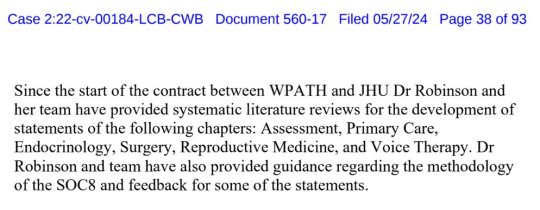


==
So, there are 6 completed reviews sitting somewhere, that WPATH knows shows undesirable (to them) results. And they know it. And despite - or perhaps, because of - that, they wrote the insane SOC8 anyway. And then, at the behest of Rachel Levine, went back and took out the age limits, making it even more insane.
This isn't how science works, it's how a cult works.
When John Templeton Foundation commissioned a study on the efficacy of intercessory prayer, a study which unsurprisingly found that it's completely ineffective, it was forced to publish the negative results.
So, even the religious are more ethical than gender ideologues when it comes to science. This is outright scientific corruption.
#Jesse Singal#Johns Hopkins#Johns Hopkins University#WPATH#World Professional Association for Transgender Health#anti science#gender cult#corruption#medical malpractice#medical corruption#medical scandal#systematic review#Cass review#Cass report#gender affirming care#gender affirming healthcare#gender affirmation#ideological corruption#religion is a mental illness
262 notes
·
View notes
Text
I think sometimes about how so many people discourage labels and specificity and pathologizing anything about yourself and frame it as countercultural. Meanwhile, people in the mainstream will tell you the same. I think about this because I have talked with a lot of people about the schizophrenia spectrum who absorbed the idea that diagnosis doesn't matter, labels don't matter, just get help for who you are... and they felt empty and hopeless. The therapy wasn't working, the medicine wasn't working. Their symptoms didn't make them look different than other people on the outside, but on the inside, their experience was specific. The specificity is the only thing that gave them the chance to find any solace at all.
The DSM is flawed, but I question those that seem to want to abolish psychiatry and specificity and claim we're all experiencing one thing. We're all experiencing the trauma of the outside world. There's no reason for these words. Etc etc. There's clearly some scientific flaw in categorization when most people will walk out of a psych eval with a long list of disorders, but I resent those who say that the simple discomfort of seeing a long list is what's wrong there; that specificity, "pathology", is the enemy. When you have a word for a specific experience, you can research it, you can help it. If we name every bacteria, we can understand each one, but naming mental illnesses seems to make even mental health professionals uncomfortable. So many people deny us specificity. They hate it when we come and ask to be treated for X thing we suspect we have. They hate when we form an identity around our mental condition. They fold everything into one big name. Anxiety. Depression. CPTSD. Then we accept that and try to get help, and we feel nothing. We try to form an identity, and we're told that forming an identity around a diagnosis is pathologizing and wrong. Even some leftists want to tell you it's wrong. It's unnatural. There's no point to it.
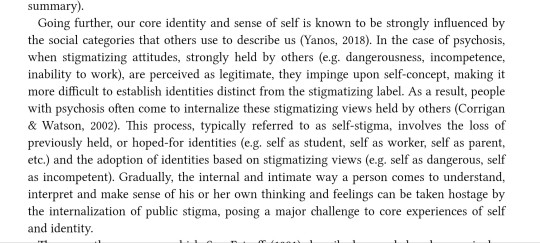
Meanwhile, I always remember reading how people with schizophrenia spectrum illnesses seemed to benefit greatly from narrative therapy where they related and made community over their collective oppression. They used schizophrenia and ableism to unite and be more than an individual, but also to be something that really tangibly in the world at all. Disability theory brings us together, a refusal to view the self as any different from abled people often only isolates us.
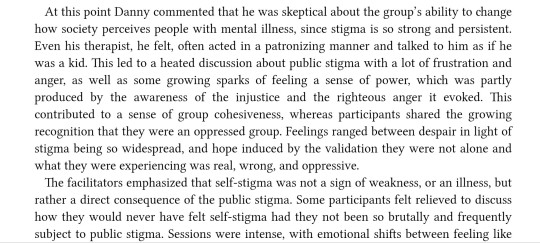
(From Recovery of the Self in Psychosis)
380 notes
·
View notes
Note
any thoughts on the obsession with "hyperprocessed foods"? is there even such a thing and if so how much of the stuff around it is fake?
such a flawed useless categorisation lmao; this phrase comes from the nova scale, according to which an "ultra-processed food" is identified by a lack of sufficient "intact" food and the presence of "sources of energy and nutrients not normally used in culinary preparations" and additives specifically "used to initate or enhance the sensory qualities of food or to disguise unplatable aspects of the final product" (other additives, such as preservatives, antioxidants, and stabilisers, only qualify a food as group 3, "processed"). ultra-processing is defined as "a multitude of sequences of processing [...] includ[ing] several with no domestic equivalents," and ultra-processed foods are "usually packaged attractively and marketed intensely."
......so ok, first of all, this is very obviously reliant on a lot of assumptions about what 'normal' cooking and cooking equipment means, lmao. i do all kinds of shit in the kitchen that would have been inaccessible to someone in the mid nineteenth century; has the food become 'less processed' because i can make it at home now? if i obtained the equipment to hydrogenate oils myself would they magically not be ultra-processed simply because they came from my kitchen and not from an industrial setting?
this is just quasi-scientific language to express a fundamental distrust of food produced in ways that currently can't be replicated in [researchers' definitions of] a [normal] home kitchen. it's barely more sophisticated than platitudes like michael pollan's command to "eat only foods your grandmother would recognise". using the nova classifications to make assumptions about the healthfulness or danger of a food is just silly; the presumption is that the dietary and medical effects are not due to the food itself but to how it's produced, an idea that has led researchers to conclude that "the NOVA system suffers from a lack of biological plausibility so the assertion that ultra-processed foods are intrinsically unhealthful is largely unproven."
fundamentally the only evidence that nutritional scientists have been able to produce is observational studies showing a correlation between certain ill health outcomes and consumption of 'ultra-processed food'.
But the observational studies also have limitations, said Lauren O’Connor, a nutrition scientist and epidemiologist who formerly worked at the Department of Agriculture and the National Institutes of Health. It’s true that there is a correlation between these foods and chronic diseases, she said, but that doesn’t mean that UPFs directly cause poor health.
Dr. O’Connor questioned whether it’s helpful to group such “starkly different” foods — like Twinkies and breakfast cereals — into one category.
[...]
Clinical trials are needed to test if UPFs directly cause health problems, Dr. O’Connor said. Only one such study, which was small and had some limitations, has been done, she said.
ie, when evaluating the healthfulness of foods you have to actually look at what they are and what the human body does with them, and not just make a bunch of wild assumptions based on fears about their lack of proximity to 'naturalness' or propensity to be advertised (unlike, i guess, other more intact foods, which are not commodities. who knew!)
and there are like a million trillion other reasons why this correlation might hold: off the top of my head, for instance, people who rely more on the convenience of ready-made foods likely to be categorised as 'ultra-processed' are likely to be people who can't cook because they don't have time because they're working. so as usual nutrition and health science does a dogshit job distinguishing between the health effects of socioeconomic status and those of whatever some dickwad wants to publish a splashy study about.
there are certainly 'ultra-processed' foods that we can be extremely confident are harmful to human health---for example, trans fats. but the categorisation as a whole is so conceptually flawed as to be useless for any purpose besides as a term that 'scientises' culturally held beliefs about the wholesomeness and healthfulness of home food preparation, and the corresponding danger and artificiality of industrial production and methods.
303 notes
·
View notes
Text
Therapist was very amused by the "Doing A Stupid Powerpoint For My Stupid Mental Health" presentation I gave her, and gave me permission to share it (lightly annotated) with all of you.
(Also she said I give very entertaining powerpoint presentations, so I'm still getting a good grade in therapy!)
This covers my own research as a layperson into emotional regulation and dysregulation in adult ADHD, and ways to affect it with cognitive training and mindfulness. Because I am a results-oriented person, I was tightly focused on what has actually shown to be impactful in studies, so while things like "Coherent Breathing" are often pushed by the less scientific side of the mindfulness niche, if it's in this presentation it's because someone did a study on it and got meaningful enough results that I'm willing to try it as a technique.
There is plenty of literature in the psychiatric/cognitive field that got results but incorrect ones, of course, so take it all with a grain of salt, but I'm reasonably confident in the conclusions I've drawn at least about mindfulness.
591 notes
·
View notes